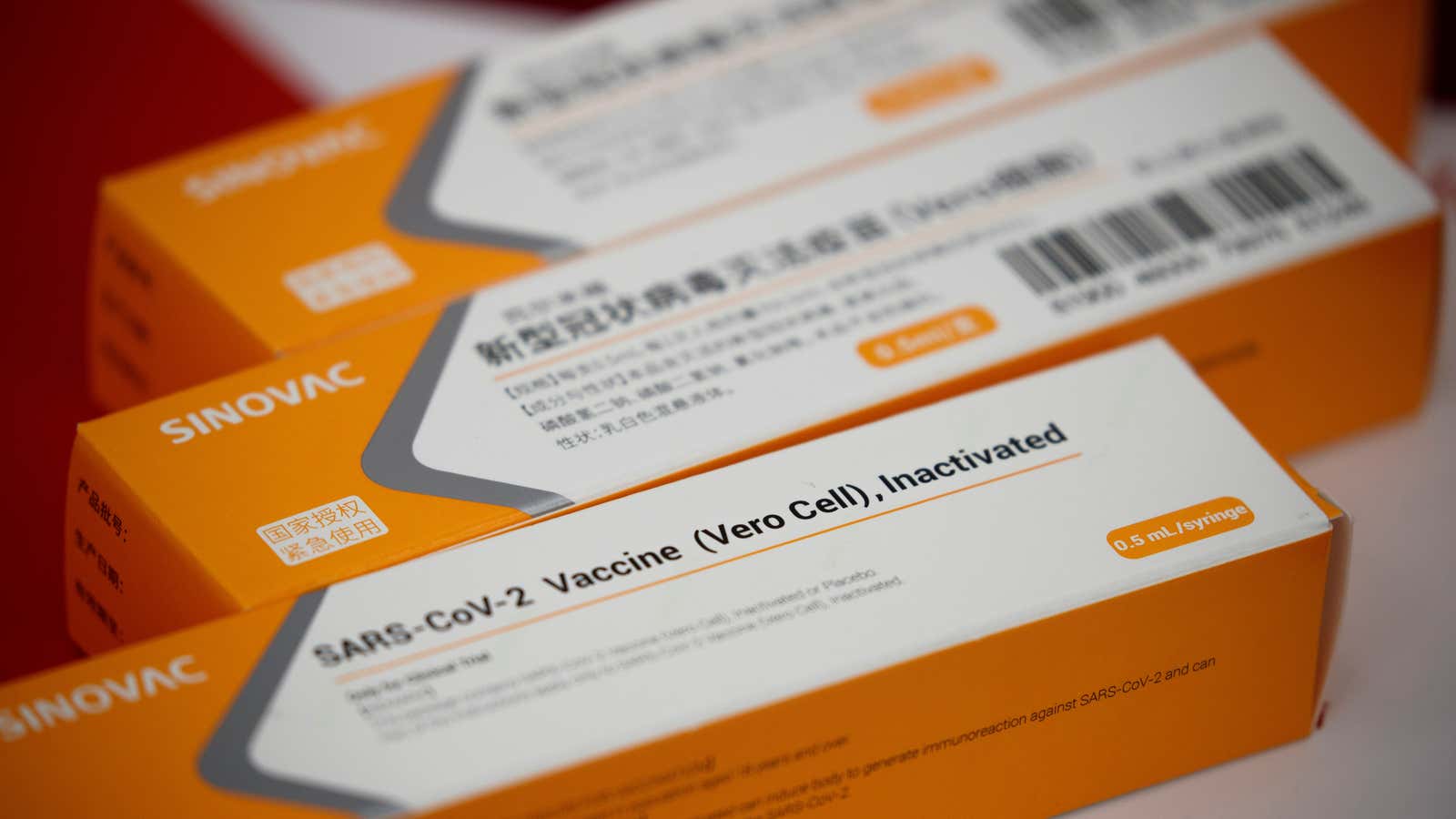The Hong Kong government today granted emergency use authorization to Chinese drugmaker Sinovac’s Covid-19 vaccine, making it the city’s second approved coronavirus shot after authorities greenlighted the Pfizer-BioNTech jab last month.
The Sinovac approval comes after the government’s expert advisory panel reviewed new data from the drugmaker that showed an efficacy rate of over 62% when two doses are administered 28 days apart. That’s higher than the 50% efficacy reported last month by Brazil’s Butantan Institute, which conducted late-stage trials in the country.
However, Sinovac’s latest data has not been published in a peer-reviewed journal, or made public, a typical precursor to regulatory approval in Hong Kong. It has not received an official recommendation from the World Health Organization, either. By contrast, trial results for other coronavirus vaccines including those from Pfizer-BioNTech, Oxford-AstraZeneca, and Moderna have been published in peer-reviewed journals.
The head of an advisory panel that recommended the Hong Kong government approve the vaccine said Sinovac provided its data to them, which it examined as it would for peer-reviewed publication.
Siddharth Sridhar, a clinical virologist at the University of Hong Kong, called on the government to publish Sinovac’s new data. “Release it publicly,” he wrote in a tweet yesterday following the government advisors’ official recommendation of the Sinovac shot, adding, “I do feel bad for our experts. A regulatory approval process is not meant to be a peer review. Journal peer reviewers don’t have to defend their decisions in public.”
Hong Kong is expected to begin vaccinations early next month, and the first batch of one million Sinovac shots is expected to arrive tomorrow (link in Chinese), according to local newspaper Apple Daily. The city also has an agreement with AstraZeneca to secure its vaccine, though it has not yet approved the shot.
The government announced in December that it had procured 7.5 million doses of each of the three shots, totalling 22.5 million doses for the population of 7.5 million. It has also pledged to let Hong Kongers choose which of the three vaccines to receive.
The question remains whether Hong Kongers will trust a vaccine from a Chinese drugmaker. The city’s residents are well aware of regulatory issues and past vaccine scandals in the mainland. Then there is the significant distrust of the government among Hong Kongers, in large part due to authorities’ handling of and crackdown on the city’s protests. That distrust has since seeped into the public health sphere, starting with the government’s push for universal Covid-19 testing with Beijing’s backing, followed by a series of daily “ambush lockdowns” that started late last month.
A recent survey conducted by the University of Hong Kong’s medical school found that under 30% of respondents regard the Sinovac vaccine as acceptable in light of some results showing a 50% efficacy. That compares with nearly 56% who say the Pfizer-BioNTech vaccine is acceptable. Still, Sridhar, the clinical virologist, said he believes there’s a “niche” for the Sinovac jab in Hong Kong, particularly among the elderly because of its limited side effects.
Asked during a press conference last month what the government should do to address the evident “trust deficit” among Hong Kongers with regards to the Sinovac jab, Gabriel Leung, dean of the University of Hong Kong’s medical school and a member of the government’s pandemic advisory council, said “openness and really allowing science to lead” are key.
So far, however, the lack of publicly available vaccine data from Sinovac means such openness is in limited supply.
